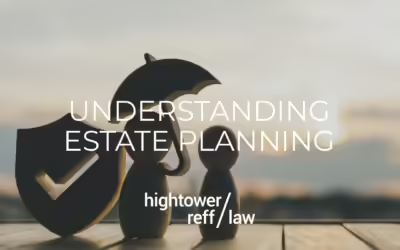Three Questions To Create an Estate Plan
When talking about wills and estate planning, it is important to have a comprehensive conversation with an experienced, local estate planning lawyer about your assets and desires. In this blog, we are going to look at the process of what happens to assets after death. When someone dies, their estate has to be “administered” either by your executor or the court.
At Hightower Reff Law, we start with three basic questions to begin the discussion of the administration of an estate: (1) What are the assets? (2) How much is each asset worth? (3) How is each asset titled (or who owns it)? The answers to these three questions guide the process of the administration of your estate. When you are putting together your plans with your estate planning attorney, it is helpful to consider the answers to these questions to ensure that your ultimate wishes are carried out.
What are the assets?
This question is important because it defines the scope of the administration of the estate. For example, if you own real estate in Nebraska, Iowa and Kansas, probate proceedings may be required in each of those states in order to fully administer your estate. This can be costly and time consuming if your estate was not well planned with an experienced estate planning attorney. If you are planning your estate and you own property in more than one state, you should discuss the various estate planning tools with your attorney to avoid multiple unnecessary estate administrations.
When you create your estate plan, it is important to take a full inventory of your assets. You can discuss your inventory with your estate planning lawyer, who will help create an estate plan that is best for you. Click here for more information on trusts.
How much is each asset worth?
In the state of Nebraska, if your estate is valued less than $50,000 in personal property and less than $50,000 in real property, a “small estate” may be possible as a means of distributing your assets. This allows your estate (and beneficiaries) to avoid a potentially costly probate process to administer your estate.
Also, Nebraska inheritance tax may come into play for some assets. The value of each asset, on the date of your death, is the value used to determine whether your beneficiaries will have to pay an inheritance tax. Your estate planning attorney will help you create an estate plan that can lower tax burdens for your beneficiaries. You may be able to utilize a life insurance policy to reduce tax burdens on your beneficiaries. When you create your estate plan, your experienced estate planning attorney will discuss all of the various options you can use to avoid costly and unnecessary procedures in court later.
How is each asset titled?
How an asset is titled is very important. Assets that are owned by a person in “joint tenancy” will pass to (or remain with) the joint tenant (other owner) when the decedent dies. Assets owned by a person with a beneficiary designation, such as a life insurance policy or a retirement account, will be passed to the beneficiary designated at the time of the person’s death. These types of assets are typically not controlled by a will.
For example, let’s say your mom owned a bank account with your sister in joint tenancy. In your mom’s will, she has indicated her beneficiaries are her three children in equal shares. At the time of your mom’s death, the joint tenancy account will go directly to your sister, not all of her three children in equal shares. It is possible, in this example, that your mom wanted your sister to receive the joint account; if your mom intended for the account to pass to her three children under her will in three equal shares, the joint tenancy titling of the account would prevent the account from administration under the will.
This simple mistake can lead to costly and unnecessary hearings in court, as well as family conflict. If your mom had identified her assets with her estate planning attorney and titled the assets in a way that actually reflected her desire, there would be no problem administering her estate the way she intended.
Meet with an experienced estate planning lawyer near you.
Start your estate planning by asking yourself these three questions. By understanding these concepts, you will be able to work with an estate planning attorney to create the best estate plan for you. You should work with an experienced estate planning attorney when you are creating your estate plan. No matter how big or small your estate is now, there are estate planning tools that will help avoid costly mistakes, unnecessary tax burdens or court hearings for your beneficiaries.
At Hightower Reff Law, we have experienced estate planning attorneys who can help you create the estate plan that is right for you.
This article should not be construed as legal advice. Situations are different and it’s impossible to provide legal advice for every situation without knowing the individual facts.
Click here for additional resources on estate planning.




